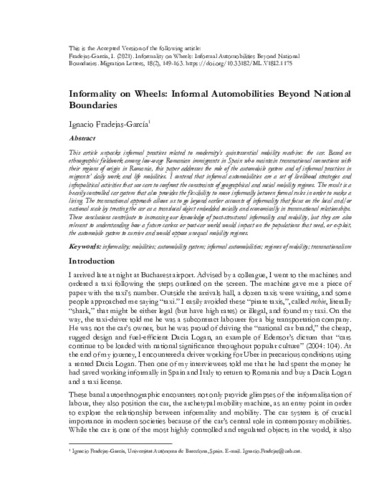Informality on Wheels: Informal Automobilities Beyond National Boundaries
Autor(es) y otros:
Palabra(s) clave:
informality
cars
transnationalism
networks
informal practices
mobilities
regimes of mobility
informal automobilities
automobility system
Fecha de publicación:
Editorial:
Transnational Press London
Versión del editor:
Citación:
Descripción física:
Resumen:
This article unpacks informal practices related to modernity’s quintessential mobility machine: the car. Based on ethnographic fieldwork among low-wage Romanian immigrants in Spain who maintain transnational connections with their regions of origin in Romania, this paper addresses the role of the automobile system and of informal practices in migrants’ daily work and life mobilities. I contend that informal automobilities are a set of livelihood strategies and infrapolitical activities that use cars to confront the constraints of geographical and social mobility regimes. The result is a heavily controlled car system that also provides the flexibility to move informally between formal rules in order to make a living. The transnational approach allows us to go beyond earlier accounts of informality that focus on the local and/or national scale by treating the car as a translocal object embedded socially and economically in transnational relationships. These conclusions contribute to increasing our knowledge of post-structural informality and mobility, but they are also relevant to understanding how a future carless or post-car world would impact on the populations that need, or exploit, the automobile system to survive and would oppose unequal mobility regimes.
This article unpacks informal practices related to modernity’s quintessential mobility machine: the car. Based on ethnographic fieldwork among low-wage Romanian immigrants in Spain who maintain transnational connections with their regions of origin in Romania, this paper addresses the role of the automobile system and of informal practices in migrants’ daily work and life mobilities. I contend that informal automobilities are a set of livelihood strategies and infrapolitical activities that use cars to confront the constraints of geographical and social mobility regimes. The result is a heavily controlled car system that also provides the flexibility to move informally between formal rules in order to make a living. The transnational approach allows us to go beyond earlier accounts of informality that focus on the local and/or national scale by treating the car as a translocal object embedded socially and economically in transnational relationships. These conclusions contribute to increasing our knowledge of post-structural informality and mobility, but they are also relevant to understanding how a future carless or post-car world would impact on the populations that need, or exploit, the automobile system to survive and would oppose unequal mobility regimes.
Patrocinado por:
This article was supported by the author’s FPI grant (BES-2016-076859), which is co-funded by the European Social Fundand the Ministry of Economyand Competitiveness, Government of Spain. I thank the unconditional support and wise advice of Miranda J. Lubbers and José Luis Molina, the principal investigators of the ORBITS project, which has also supported this study and is funded by the Ministry of Economy and Competitiveness, Government of Spain (MINECO-FEDER: CSO2015-68687-P, 2016-2020)
Colecciones
- Artículos [37549]
- Sociología [137]
Ficheros en el ítem

Métricas
Compartir
Estadísticas de uso
Metadatos
Ítems relacionados
Mostrando ítems relacionados por Título, autor o materia.
-
Introducción al "Informe sobre Los Oscos"
Álvarez Castrillón, José Antonio (Canela Produccións, Editorial Etnográfica, 2008)
(Canela Produccións, Editorial Etnográfica, 2008)


